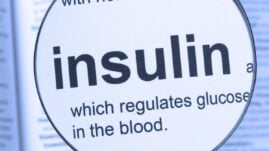Pursuing pregnancy as a woman with type 1 diabetes is something many women may not have considered safe just a couple of decades ago. Today, more and more women around the globe with diabetes are experiencing pregnancy and becoming mothers.
Thanks to advances in technology, support, and medications, it’s a very reasonable and achievable endeavor.
That being said, it isn’t easy. And you should be as prepared as possible for the challenges that come with pregnancy.
In this article, we’ll discuss the most important things every woman with type 1 diabetes needs to know about pregnancy.

Table of Contents
- Your blood sugars before you become pregnant are very important
- Work with the right doctor
- If you take insulin
- You do not need to achieve “perfect” blood sugars to conceive and birth a healthy, happy baby
- Doctors will constantly remind you that your baby might be “fat” at birth
- Your nutrition choices matter more than non-diabetic women pursuing pregnancy
- If you don’t already walk daily, pregnancy is the time to start
- Your mental and emotional endurance will be tested daily
- Give an insulin pump and CGM a try, if you haven’t already
- Women with diabetes can absolutely breastfeed!
Your blood sugars before you become pregnant are very important
While you’re likely aware of how important blood sugar management is during pregnancy, your blood sugar levels in the 6 months leading up to your pregnancy are also critical.
“First, consistently high blood sugar levels can actually impact your ability to conceive,” explains Jennifer Smith, RD, CDE, and co-author of the book Pregnancy with Type 1 Diabetes.
A1c levels above 7.0 percent can decrease your fertility and increase your risk of an early miscarriage, particularly during that first month when you’re waiting to find out if you’re actually pregnant.
The second reason is that persistently high blood sugar levels during those 6 months prior to conception can significantly increase the risk of a birth defect in your baby. Your blood sugars impact how your body functions, explains Smith, which includes the health of your eggs, ovulation, and entire reproductive system.
In other words: the healthier your body is during the months prior to becoming pregnant, the healthier your eggs will be, too.
Aiming for an A1c below 7.0 percent — and as close to 6.0 percent as possible — is going to reduce those risks and create the best possible environment for a fetus.
Work with the right doctor
A high-risk OB-GYN maternal-fetal medicine (MFM) doctor will give you the most support — even if you’re already very on top of your diabetes management.
You might think a “high-risk” OBGYN sounds like a horrible way to start a pregnancy, especially if you aren’t struggling to manage your diabetes prior to pregnancy, but they actually have a great deal to offer.
One of the greatest benefits of seeing an MFM OB-GYN during your pregnancy is that they have in-depth knowledge of all the increased risks your body faces as a woman with diabetes, even if you are incredibly healthy.
For instance, an incredibly healthy woman with type 1 diabetes can still experience pre-eclampsia. Despite tight blood sugar management, your body is still a body with a chronic illness. These doctors specialize in monitoring those details. (And there are many more!)
Secondly, they know what great diabetes management looks like.
Personally, I did not go to a high-risk OB-GYN office for my first pregnancy, and I was constantly trying to teach my OB team what real life with type 1 diabetes looks like. I remember being shamed and scolded for a post-meal blood sugar level of 165 mg/dL when my A1c was actually at 5.1 percent!
They didn’t understand the bigger picture. They didn’t understand that some high blood sugars were inevitable and I was doing the best I can.
The high-risk office, on the other hand, never gave me a hard time about my blood sugars because they knew far better what real life with type 1 diabetes is like. They knew that a blood sugar of 165 mg/dL was not worth getting upset over, and was simply proof that I needed slightly more insulin with that type of meal next time.
If you take insulin
If you take insulin, you will need to make adjustments often throughout your entire pregnancy.
Throughout your entire pregnancy, different hormones are going to be fluctuating significantly — and hormones have a tremendous impact on your insulin needs.
For instance, some women with type 1 diabetes who still have degrees of beta-cell function will actually start producing some of their own insulin again. In general, all women will become more sensitive to insulin in the first trimester. This begins anywhere between the 6 to 10-week mark, and it will be noticeable until you’re about 16 weeks pregnant when other hormone levels rise and you become more and more insulin resistant.
This sudden ability to produce insulin is the result of your immune system actually backing off in order to protect the fetus, and as a result, your pancreas is able to successfully produce some insulin.
Many women will see a dramatic decrease in their insulin needs while others may only see a slight decrease.
Between the 16-week mark of pregnancy and when you give birth, your insulin needs will need to be adjusted (likely increased) sometimes every week to account for your increasing hormone levels.
Working closely with your OB-GYN team, your CDE, or a pregnancy coach, will be critical to ensuring you’re making the insulin adjustments you and your baby need.
You do not need to achieve “perfect” blood sugars to conceive and birth a healthy, happy baby
It should be well understood that perfect blood sugar management during pregnancy is simply not possible. In a body that struggles to properly produce or properly use insulin, you are simply going to do the very best you can do each and every day of your pregnancy.
Some days, that might look nearly perfect on a blood sugar graph. Other days, it definitely won’t.
Thanks to insulin pumps, continuous glucose monitors, and newer types of insulin and medications, women with diabetes can achieve very tight blood sugar levels for most of their of their pregnancy.
However, the only way you’ll know it’s time to increase your insulin doses is by noticing that your blood sugar levels are starting to trend higher.
Additionally, you’ll find as your pregnancy progresses that you’ll need to dose your insulin sooner and sooner before eating a meal in order to prevent a post-meal spike in your blood sugar. The only way to learn it’s time to start dosing sooner is by observing those higher post-meal levels.
At the end of the day, you are going to do the very best you can. Some days will go incredibly well, some days will be incredibly frustrating. The best thing you can do for your growing baby is to pick yourself up and keep trying!
Doctors will constantly remind you that your baby might be “fat” at birth
This one is a real shame, because as noted above: women with diabetes cannot realistically achieve non-diabetic blood sugar levels. In order to do so would mean maintaining a 5.0 A1c throughout pregnancy, which would likely put both mama and baby at risk because of the increased likelihood of low blood sugar levels.
Despite this understanding, you may find that your doctors still feel a need to constantly remind you that your baby is at risk of being “fatter” than a normal baby during the last trimester and at birth.
The extra chub is the result of higher blood sugar levels. When your baby receives that extra glucose in your bloodstream, it produces extra insulin to make use of it and consequently stores more body fat while in utero.
What you might find frustrating, however, is how often this is mentioned during your ultrasounds. It can feel like a constant threat — one that is unnecessary if you’re already demonstrating intense attention to your diabetes management.
It can also be frustrating when your baby is born and weighs anywhere over 8 lbs. While lots of babies born to non-diabetic women weigh over 8 lbs., your healthcare team may tell you that your baby is “large” because of your diabetes. When, in fact, they don’t know what for sure at all!
Your nutrition choices matter more than non-diabetic women pursuing pregnancy
Let me start by saying that you do not have to eat perfectly throughout your pregnancy. That being said, women with diabetes absolutely need to approach everything they choose to eat with far more thought (and planning) compared to non-diabetic pregnant women.
For example, giving in to a craving for ice cream if you have diabetes should go hand-in-hand with counting the carbs and timing your insulin for the fact that ice cream contains a lot of fat. That means slower digestion, which means you may not need your entire insulin dose up front, but instead split into two doses.
And giving in to a craving for something indulgent and heavy like ice cream once a day is reasonable, but for the sake of blood sugar management, it’s crucial to ensure the rest of your day’s choices are as healthy and as clean as possible.
You’ve probably heard your non-diabetic friends describe the loaves of bread or entire pizzas they ate during their pregnancy. As a woman with diabetes, you’ll simply want to apply more self-restraint when facing those cravings.
And, in the end, the more excess weight you gain during your pregnancy, the more insulin-resistant you’ll become. By choosing healthy foods most of the time you’ll prevent excess weight gain and you’ll make your diabetes management goals easier.
All of which, of course, is best for that growing baby!
If you don’t already walk daily, pregnancy is the time to start
Well, sure, some women continue to run marathons and do CrossFit workouts throughout every month of pregnancy, but that’s not most women.
Instead, consider walking your new best friend as a woman with diabetes. Going for a 15 or 30-minute walk after lunch, for example, can significantly reduce that post-meal blood sugar spike.
If you don’t take insulin, using walking as a method for managing your blood sugar around meals can have a huge impact on your overall diabetes health during pregnancy.
If you do take insulin, you may find you’ll want to cut back the insulin dose for that meal if you plan to walk afterward. (Remember to always carry fast-acting glucose with you for low blood sugars!)
Regardless, to combat the increasing insulin resistance created by pregnancy in those last two trimesters, it is critical that you stay active. While the last month or two of pregnancy can present physical challenges for some (pain and discomfort), do the most walking you safely and comfortably can.
Your mental and emotional endurance will be tested daily
Even when you are not pregnant, living with diabetes can take a significant toll on your self-esteem, your confidence, and your energy to face it again the next day.
As a woman with diabetes pursuing pregnancy, you should prepare yourself emotionally and mentally as much as possible.
During pregnancy, stubborn high blood sugars can come with guilt, tremendous stress, and a feeling as though you’re already failing as a mother. But there will be high blood sugars. And there will be lows, too.
Learning how to talk yourself through those hours by reminding yourself that you’re doing the very best you can at any given moment is crucial.
Address the blood sugar rationally by taking a carefully calculated correction dose of insulin or contacting your healthcare team to help adjust your medications. And then take a deep breath, and move on.
This is not a journey you can quit when things get tough. Bring your A-game and talk yourself through it.
Give an insulin pump and CGM a try, if you haven’t already
While you can absolutely pursue pregnancy successfully without fancy gadgets, it will require significantly more finger sticks and significantly more injections in order to keep your blood sugar levels within that ideal tighter range.
You may not want to wear an insulin pump or a CGM on a regular basis, but during pregnancy, they can be one of those helpful tools at your disposal.
Personally, I was willing to take as many injections as necessary to avoid wearing a pump, but I did use a CGM and found it unbelievably helpful during my first pregnancy. During my second, I wore it for the first trimester and then used everything I’d learned during my first pregnancy (along with a lot of test strips) to help me maintain my blood sugar goals throughout the rest of that pregnancy.
If you’re interested in starting on a pump or CGM (ideally before you become pregnant), talk to your healthcare team about today’s options and which might be best for you.
Women with diabetes can absolutely breastfeed!
Don’t let the warnings and threats in stale medical articles leave you convinced that your body will struggle to produce milk. Women with type 1 diabetes can absolutely breastfeed their children!
Diabetes alone does not mean your body will have a hard time with breastfeeding.
Diabetes that isn’t being managed well, however, can create challenges that are only fixed by getting your blood sugars back into your goal range. Again, this doesn’t mean your blood sugars need to be perfect, but healthy blood sugar levels make for a healthier mother and healthier breastmilk — period!
Use this as motivation to continue with that arduous diabetes management work after your baby is born!
That being said, breastfeeding is a lot of work. In many ways, you won’t understand this until you’re the one making the milk. While it’s Mother Nature’s intention, it can be incredibly exhausting, painful, and challenging. And when your body is replenishing your milk supply after a feeding, you can easily experience low blood sugars simply from the energy required to produce more milk.
The very best thing I did for myself after my 2nd child was born was stock up on formula in order to take the pressure off of me to make sure I was constantly nursing or pumping enough milk. Having formula on hand gave me the freedom to leave my baby with grandma without trying to pump 3 bottles of milk while also chasing a toddler around the house.
You’re still a woman with a very high-maintenance disease after your baby is born. Do the very best you can with breastfeeding, but remember that a happy mama is what makes for a happy baby!




DorKendra
Thank you Ginger for this article. It has giving me great insight on what to expect when expecting with type one diabetes. My partner and I plan on trying to conceive within the next month or two I’m excited and nervous my current A1c level is a 7.5. My doctor want me to get as close to 7 as possible. I greatly appreciate you for writing this article.